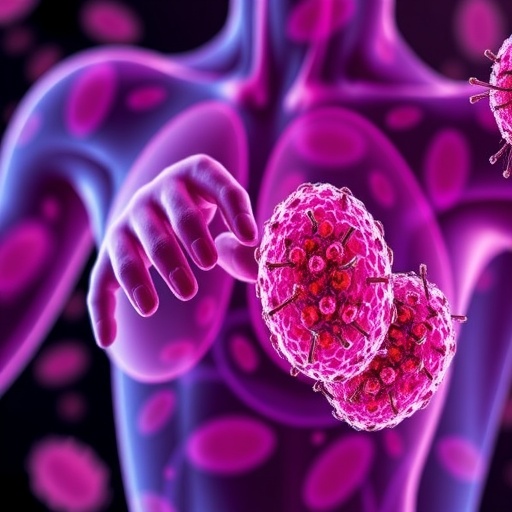In a groundbreaking study published by Yang and Wang, the intricacies of immune evasion in triple-negative breast cancer (TNBC) are unveiled, revealing recent advancements in understanding this aggressive subtype of breast cancer. TNBC is characterized by the absence of estrogen receptors, progesterone receptors, and human epidermal growth factor receptor 2 (HER2), making it notoriously difficult to treat. Patients with TNBC often face a poor prognosis due to its rapid progression and high rates of metastasis. The complexity of its biology poses significant challenges in developing effective immunotherapies.
Recent findings highlight the role of the tumor microenvironment in shaping immune responses and the mechanisms through which TNBC escapes immune surveillance. Various immune cells such as T cells, dendritic cells, and natural killer cells are essential components of the immune system that can potentially target and destroy tumor cells. However, TNBC has developed sophisticated strategies to inhibit these immune responses, allowing it to proliferate unchallenged. The research by Yang and Wang provides insights into the molecular pathways that facilitate immune evasion in this aggressive cancer subtype.
A key aspect of the immune evasion in TNBC is the expression of immune checkpoint molecules, such as PD-L1, which binds to PD-1 on T cells, effectively inhibiting their function. This interaction depletes the immune response against tumor cells, allowing cancer cells to thrive. The study emphasizes the need to understand the dynamic expression of such checkpoints in TNBC, as targeting these pathways could enhance the efficacy of existing immunotherapies.
Moreover, the tumor microenvironment is composed not only of cancer cells but also of various stromal and immune cells that interact in complex ways. The presence of immunosuppressive cells, such as regulatory T cells and myeloid-derived suppressor cells, further complicates the immune landscape. These cells can promote tumor growth and inhibit the effectiveness of immunotherapies. Yang and Wang underline the importance of these interactions in the tumor microenvironment, suggesting that therapeutic strategies should be developed to alter the immune landscape favorably.
Furthermore, the researchers discuss the role of cytokines and chemokines in TNBC, which can either promote inflammation or facilitate immune evasion. The balance between pro-inflammatory and anti-inflammatory signals can significantly impact disease progression. The production of specific cytokines by tumor cells can recruit immunosuppressive cells, illustrating the need for treatments that can counteract these signals to rejuvenate anti-tumor immunity.
The study also highlights the potential of personalized medicine approaches in the treatment of TNBC. By identifying specific biomarkers associated with immune evasion, clinicians may tailor therapies to individual patients, leading to improved outcomes. This precision medicine paradigm emphasizes the importance of understanding the unique tumor-immune interactions that characterize each patient’s cancer.
In terms of therapeutic interventions, the authors emphasize the prospects of combination therapies that integrate immune checkpoint inhibitors with other treatment modalities. Such strategies could potentially enhance tumor response rates and improve patient survival. For instance, combining immune checkpoint blockade with chemotherapy or targeted therapies may lead to more robust anti-tumor activity by altering the tumor microenvironment in favor of immune activation.
Another fascinating avenue explored in the study is the potential of novel immunotherapeutics that target different aspects of immune evasion. One such approach involves harnessing the power of engineered T cells, such as CAR-T cells, which have shown promise in other malignancies. However, their effectiveness in solid tumors like TNBC is still being explored, and understanding the resistance mechanisms will be vital for their success.
The evolving understanding of the role of the microbiome in cancer immunology also warrants attention. Recent evidence suggests that the gut microbiome can influence the effectiveness of cancer therapies, including immunotherapy. The interplay between the microbiome and the immune system in TNBC is an exciting area of research that holds the promise of novel therapeutic strategies.
Moreover, the implications of tumor heterogeneity in TNBC cannot be overlooked. The presence of different cancer cell subpopulations within the same tumor can lead to varied responses to treatment. The study discusses the need for advanced biomarker techniques to monitor these heterogeneous populations to provide better treatment options.
As research continues, the focus must remain on the interplay between the immune system and cancer. Understanding how tumors manipulate immune responses will be key to developing more effective treatments. The findings by Yang and Wang serve as a reminder that the fight against TNBC is multifaceted and requires a comprehensive approach that considers both the tumor and the immune system.
The ongoing research into the immune evasion mechanisms in triple-negative breast cancer as illustrated in this study will undoubtedly pave the way for innovative treatment modalities. As therapies evolve, the hope is to transform TNBC from one of the most challenging breast cancer subtypes into a manageable condition, improving outcomes for patients worldwide. Continued efforts in this arena could ultimately lead to breakthroughs that harness the full potential of the immune system against TNBC.
In conclusion, the recent insights into the immune evasion mechanisms of triple-negative breast cancer contribute significantly to our understanding of this disease. The work of Yang and Wang presented in J Transl Med serves as a critical step forward in the quest for effective treatments. This ever-evolving landscape of cancer immunology emphasizes the need for collaborative efforts in research, clinical trials, and the integration of multidisciplinary approaches to tackle the challenges posed by TNBC.
Subject of Research: Immune evasion mechanisms in triple-negative breast cancer.
Article Title: Recent progress in immune evasion mechanisms of triple-negative breast cancer.
Article References:
Yang, Y., Wang, W. Recent progress in immune evasion mechanisms of triple-negative breast cancer.
J Transl Med 23, 1314 (2025). https://doi.org/10.1186/s12967-025-07370-w
Image Credits: AI Generated
DOI: https://doi.org/10.1186/s12967-025-07370-w
Keywords: triple-negative breast cancer, immune evasion, immunotherapy, tumor microenvironment, immune checkpoint inhibitors, personalized medicine, CAR-T cells, tumor heterogeneity.




